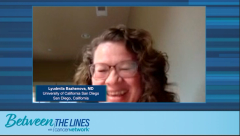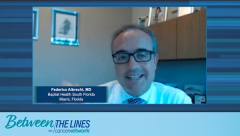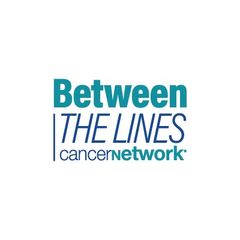
Using Various Sources of Information to Guide Management of EGFR-Mutated NSCLC
Recommendations for how to best treat patients with EGFR-mutated non–small cell lung cancer when there are discrepancies between clinical trial data and real-world evidence.
Episodes in this series

Lyudmila Bazhenova, MD: To summarize what Dr Albrecht just said, we feel that in addition to the categories that we discussed, others that are important to include in real-world evidence are the elderly. We didn’t talk about it, but those with poor performance status, there was a paper cited in that review article where EGFR tyrosine kinase inhibitors [TKIs] were given to a patient with a performance status of 3. It’s a very real patient population, and we do come across them on a regular basis.
Sequencing therapy is also important and in clinical trials, unfortunately as you see from the osimertinib study, the FLAURA study, we don’t have a good collection of data after the patients progress on the current therapy. They come off the study, and not a lot of studies collect subsequent therapy, which would be important when you look at the evidence of overall survival. Where the real-world evidence can give us some information is how the patients do when we sequence therapy one way or another.
This is a very interesting question, what if you have a situation where clinical trial data and real-world evidence don’t agree? Do you follow the clinical trial data, do you follow the real-world evidence, or neither? If you can please vote. The answers are interesting: 63% of us said that in the case where there are disparate results, they will follow the clinical trial data; 25% follow the real-word evidence; and 12% say neither, which opens to some additional clarification of that answer. Dr Albrecht, what do you do?
Federico Albrecht, MD: I would say answer No. 4 is both. This is how sometimes our practice is not straightforward. It’s more of an art, right? We sometimes have partial information, not complete information, and we have to make a clinical decision based on what we have. We know that randomized clinical trials are the gold standard. This is how we advance the science, how we interpret data, and we have to follow those because it is how science is advanced.
Understanding the limitations, many times those randomized clinical trials would not incorporate the patients or the group of patients that you’re taking care of. Obtaining real-world evidence data might give you an answer and sometimes could be contradictory. You’re going to have to employ your common sense and your knowledge to review whether the data were well collected—remember, those are the limitations of the real-world evidence—and whether they were associated with bias…as Dr Bazhenova commented.
Based on the search you do and the experience you have, you’ve got to put everything together and you make a decision. Both give you good information, complementary information, the real-world evidence. That would give you in the future more information on those patients who weren’t incorporated in randomized clinical trials. Those real-world observational, prospective studies are here to stay. If they are well conducted, they will produce powerful information, and that information will be used by the regulatory agencies to either modify, change, or approve medications.
It’s very important, and I want to reiterate this, it’s because we now have electronic medical records. Electronic medical records still have a good way to go because we can do much better work eventually, but when we manage those data, we’re going to be able to advance medicine, oncology, and thoracic oncology much faster. And why? Because remember that we use the gold standard, randomized clinical trial, but that trial tends to be slow and costly. How many times do you have the result of a huge randomized clinical trial that tells you that this medication, TKI, is better than chemotherapy? Then, for example, you don’t do that chemotherapy anymore, the standard of care has changed for real-world patients. But you are left, not in limbo, but without a complete answer.
When the results are not completely concordant, think about the group of patients that were seen in the real-world evidence, how those data were collected, and you will have follow-up real-world evidence studies that will either corroborate that or refute that. That is my take of this new era of data collection.
Transcript edited for clarity.
Newsletter
Stay up to date on recent advances in the multidisciplinary approach to cancer.





































